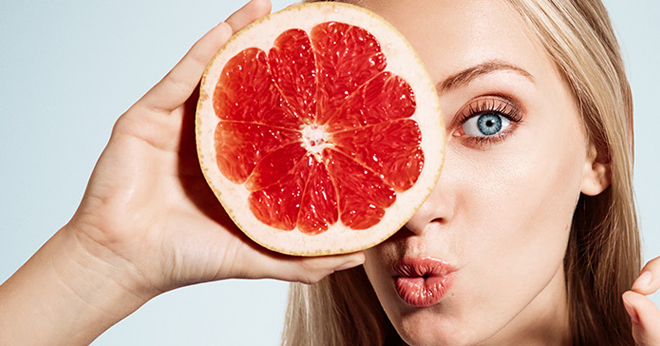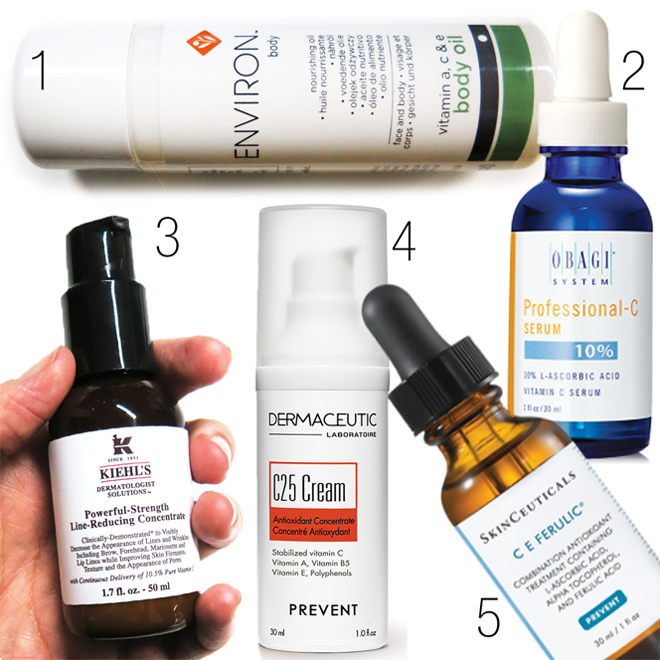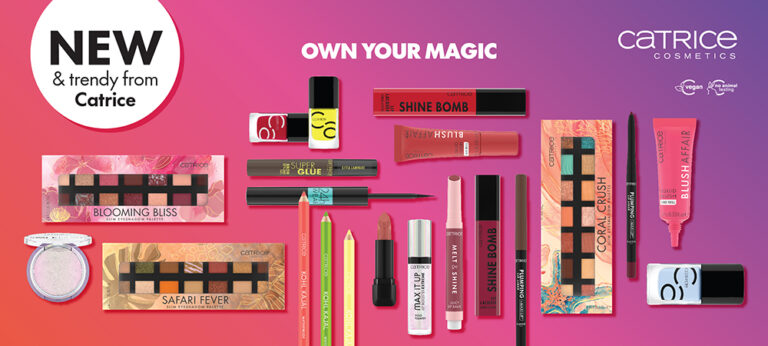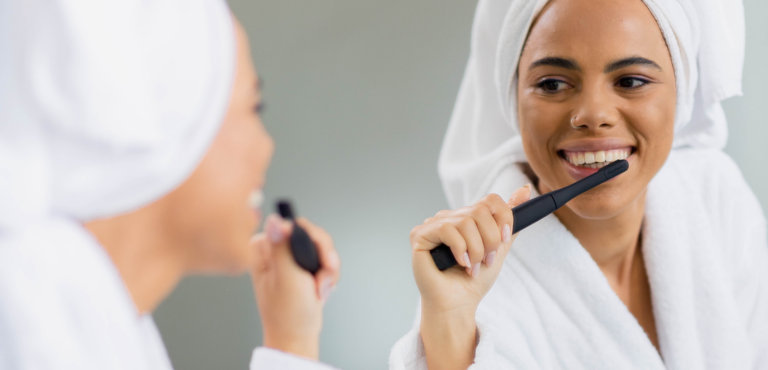Our blogger of the month, Liezel from 9Lives, explains the importance of this vital vitamin:
Vitamin C is incredibly important for our health. Think about sailors in the old days – if they went too long without eating an orange or two, they developed scurvy. Most plants and animals can make their own vitamin C, but we humans lack a particular enzyme that is necessary for this, so we need to get our vitamin C through foods like citrus fruits, green leafy veggies, strawberries, or broccoli.
Vitamin C is also incredibly potent when it comes to skincare. Unfortunately, eating a lot of vitamin C-rich foods or taking supplements doesn’t really help for your skin. You can only absorb a limited amount of vitamin C through your gut and the rest simply goes down the toilet – literally. Not much of that actually makes it to your skin, so if you want to see benefits on your face, you need to apply a good vitamin C serum or cream.
What does vitamin C do?
Vitamin C is an antioxidant so it works to neutralise free radicals that wreak havoc in your skin. Simply put, free radicals are hungry robbers that steal electrons from the molecules that make up our cells, causing damage. Antioxidants donate electrons to these free radicals, satisfying their hunger and making them stable again. Vitamins A, C and E, Resveratrol and Ferulic acid are examples of antioxidants.
Sun protection
One of the benefits of vitamin C in skincare is sun protection. In an article called “Vitamin C in Dermatology” Pumori Saokar Telang explains that vitamin C helps to protect your skin against both UVA and UVB rays. UVB rays mostly affects the top layers of our skin (the epidermis), causing sunburn and mutations that can lead to skin cancer. UVA goes much deeper into the skin where it mutates and destroys collagen, elastin and other essential structures in your skin. This causes early ageing and can lead to skin cancer.
According to Telang’s research, sunscreen ingredients only block 55% of free radicals produced by UV exposure and should be combined with topical antioxidants for the best UV protection. Vitamin C doesn’t absorb or deflect UV rays like sunscreens do, but has a powerful impact because it neutralises free radicals. According to Telang, studies have shown that applying 10% vitamin C reduced UVB-induced redness by 52% and sunburn by 40-60%.
Vitamin C is even more effective when it has vitamin E by its side. Telang explains that vitamin E can increase the power of vitamin C four times! Vitamin C works in the parts of your cell containing water, while vitamin E defends the lipid compartments, so when they join forces they’re particularly effective at limiting UV damage.
According to Plastic surgeon and Environ founder, Dr Des Fernandes, when we go out into the sun, some of the vitamin C in our skin gets lost, but it is soon replaced via the bloodstream. If you go on a beach holiday or spend a weekend outdoors, however, your vitamin C levels drop drastically, leaving you with a lot of uncontrolled free radicals. Dr. Fernandes explains that if you use a topical vitamin C, the levels in your skin are higher than normal, so you have more protection.
According to Dr Fernandes, topically applied vitamin C won’t sweat or wash off for about 3 days. By applying vitamin C every eight hours, however, you are building up a reservoir, increasing protection against photo-damage.
Collagen
Vitamin C also helps with collagen formation. Dr. Fernandes explains that vitamin C increases the production of collagen, and it also helps your body create better collagen. “Normally vitamin C ensures that proline and lysine [amino acids] are incorporated into healthy pro-collagen, which is essential to create the complex triple helical structure of collagen l and lll,” says Fernandes. He explains that if there’s not enough vitamin C in your skin, proline and lysine cannot be incorporated and you end up with abnormal collagen – a tightly wound structure that can’t be replicated. So vitamin C is super important in your skin!
Pigmentation
Your skin gets its colour from a pigment called melanin. If you make too much melanin, your skin gets darker and the pigment can appear as patches or dark spots (hyperpigmentation). Increased melanin production can be triggered by hormonal changes or sun damage. In darker skin types, a breakout or wound is often followed by a dark mark, which is called post-inflammatory hyperpigmentation.
Dr. Fernandes explains that vitamin C helps to stop melanin from forming by blocking the enzyme, tyrosinase, helping to prevent pigmentation. According to Telang, vitamin C also has the potential to reduce inflammation so it can help breakouts heal better and reduces the appearance of those post-pimple spots.
What is the best type of vitamin C?
According to Sandy Webster, co-founder of Dermastore, the best is L-ascorbic acid, which is the purest form of vitamin C. While most experts will point in the same direction, others will admit that L-ascorbic acid is notoriously unstable, and products often contain vitamin C derivatives that are also highly effective and more stable.
High concentrations of vitamin C will naturally increase the effectiveness, but Paula’s Choice creator, Paula Begoun adds that vitamin C is effective even in lower concentrations. When it comes to potent active ingredients, it is a good idea to start with lower concentrations and work your way up. Alternatively, use your serum once or twice a week and slowly increase so that your skin has time to become accustomed.
According to Webster, if you’ve never used vitamin C it’s a good idea to start around 10%, which should also be gentle enough for dry, irritated skin. If you have an oily or combination skin, you can try a serum with 20% vitamin C. Webster advises that sensitive skin types stick to lower doses.
What type of packaging should I look for?
Because antioxidants like vitamin C are sensitive to air and light, you should look for opaque packaging like dark green, blue or brown glass, and air-restricted or pump bottles.
What is stabilised vitamin C?
Webster explains that stabilized vitamin C products have been formulated to contain no water. Water acts as a catalyst of vitamin C oxidation, so a water-free (anhydrous) environment reduces the rate of vitamin C degradation. This means a water-free formulation is more stable and some say these types of products are also less likely to irritate sensitive skins.
How do I use it?
Webster recommends choosing a vitamin C serum because this has the best penetration. “Always allow a serum to absorb before applying a moisturiser and sunscreen,” she adds.
Unless otherwise specified, vitamin C products should be used in the mornings so that you benefit from the environmental protection. “It is especially beneficial when it is applied under a sunscreen as vitamin C helps to boost UV protection further,” explains Webster.
Products to try
1. Environ Vitamin A, C & E Body Oil (R253 for 100ml, select salons)
This oil can be used on your face and body and provides protection against environmental damage while improving the appearance of fine lines, uneven tone and sun damage. It contains a high amount of vitamin E and an effective vitamin C derivative, and a smaller amount of vitamin A. They recommend you use it twice a day.
2. Obagi Professional-C Serum 10% (R610 for 30ml, dermastore.co.za)
This serum contains 10% L-Ascorbic Acid and will enhance UV protection while targeting pigmentation, and promoting a smooth, even skin. Use it in the mornings and follow with a sunscreen.
3. Kiehl’s Dermatologist Solutions Powerful-Strength Line-Reducing Concentrate (R745 for 50ml)
This serum has gained iconic status since it launched 10 years ago, and was one of the first to use 10,5% stabilized vitamin C (Ascorbic Acid). It also sports blur technology, or a blend of silicones and light reflectors that will make your skin appear instantly smoother while the vitamin C does the long-term work. You can use it in the morning and evening.
4. Dermaceutic C25 Cream Antioxidant Concentrate (R620 for 30ml, dermaceutic.co.za).
This cream contains 25% vitamin C complex as well as vitamins A, B5, and E. Use it twice a day to fight premature ageing.
5. Skinceuticals C E Ferulic Acid (2126 for 30ml, dermastore.co.za)
This powerful antioxidant treatment contains 15% L-ascorbic acid, 1% alpha tocopherol, and 0.5% ferulic acid that helps reinforce the skin’s natural protection against free radicals and stimulates collagen production to diminish the appearance of photodamage. Place this serum in the fridge 12 hours before the first use to restabilise the ingredients, and don’t shake the bottle before using it. Don’t store it in the fridge again after opening. It will remain effective for a minimum of 72 hours after application.
Other articles you may be interested in:
Antioxidants and your skincare routine
Can I mix and match my active ingredients?
How to: Layer your skincare products
What can I do to get glowing skin?
Have we found the answer to firmer skin?






4 Responses
Interesting! Thank you will definitely like to try one of those products
I find that products too rich in vitamin c are too harsh for my delicate skin.
Oh my word, and here I thought vitamin D was the most important vitamin when it came to the skin. Learnt something new!
Very informative article thank you